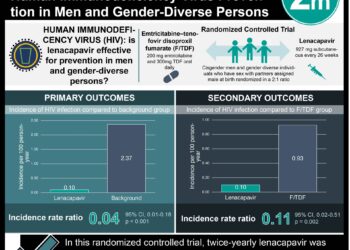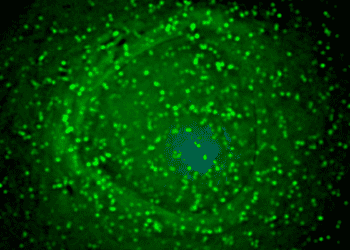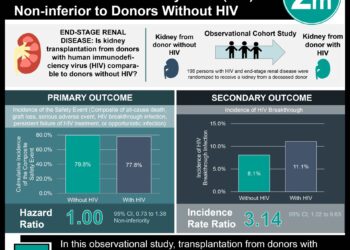Quick Take: Influence of HIV Infection on the Natural History of Hepatocellular Carcinoma: Results From a Global Multicohort Study
Hepatocellular carcinoma (HCC) is a rapidly increasing cause of morbidity and mortality in patients affected by HIV. However, the impact of HIV infection on HCC prognosis is unclear. Previous studies have provided both null results and evidence of association between HIV and HCC prognosis, but have been characterized by a lack of geographic diversity. In this cohort study, 132 HIV-positive patients and 1,456 HIV-negative patients with untreated HCC from four continents were followed to study overall survival (OS). At baseline, HIV-positive patients were younger (52.9 vs. 66 years, p<0.0001), more commonly male (94.7% vs. 81.9%, p=0.0003), and had a higher prevalence of HCV-related chronic liver disease (78% vs. 37.1%, p<0.0001) compared with patients who were HIV-negative. At the time of HCC diagnosis, most HIV-positive patients were on antiretroviral therapy (64%) and had undetectable HIV RNA levels (52%). Researchers found that HIV infection was independently associated with a 24% greater hazard of death (95% CI 2% to 52%, p=0.0333). Male sex (p=0.0016), Barcelona Clinic Liver Cancer (BCLC) stage, Child-Turcotte-Pugh (CTP) class, alpha-fetoprotein (AFP), and geographical region (all p<0.0001) were also found to be independent prognostic factors. In patients with HIV-infection, AFP (HR 1.18, 95% CI 1.09 to 1.28, p<0.0001) and CTP class C versus A (HR 2.78, 95% CI 1.31 to 5.91, p=0.0079) were both found to be independently associated with OS. This study was limited by the fact that most patients had advanced-stage HCC. Nonetheless, results from this study indicate that HIV infection may adversely influence the clinical course of HCC despite adequate antiretroviral treatment, underlining the need for immunopathologic studies of HIV-associated HCC and additional supports for patients affected by HIV.
Click to read the study in JCO
Image: PD
©2018 2 Minute Medicine, Inc. All rights reserved. No works may be reproduced without expressed written consent from 2 Minute Medicine, Inc. Inquire about licensing here. No article should be construed as medical advice and is not intended as such by the authors or by 2 Minute Medicine, Inc.







